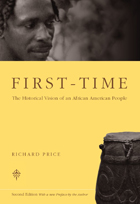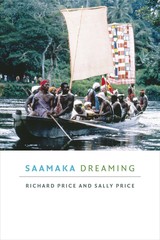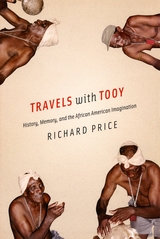4 books about Saramacca (Surinamese people)

First-Time
The Historical Vision of an African American People
Richard Price
University of Chicago Press, 2002
A classic of historical anthropology, First-Time traces the shape of historical thought among peoples who had previously been denied any history at all. The top half of each page presents a direct transcript of oral histories told by living Saramakas about their eighteenth-century ancestors, "Maroons" who had escaped slavery and settled in the rain forests of Suriname. Below these transcripts, Richard Price provides commentaries placing the Saramaka accounts into broader social, intellectual, and historical contexts.
First-Time's unique style of presentation preserves the integrity of both its oral and documentary sources, uniting them in a profound meditation on the roles of history and memory. This second edition includes a new preface by the author, discussing First-Time's impact and recounting the continuing struggles of the Saramaka people.
First-Time's unique style of presentation preserves the integrity of both its oral and documentary sources, uniting them in a profound meditation on the roles of history and memory. This second edition includes a new preface by the author, discussing First-Time's impact and recounting the continuing struggles of the Saramaka people.
[more]

Saamaka Dreaming
Richard Price and Sally Price
Duke University Press, 2017
When Richard and Sally Price stepped out of the canoe to begin their fieldwork with the Saamaka Maroons of Suriname in 1966, they were met with a mixture of curiosity, suspicion, ambivalence, hostility, and fascination. With their gradual acceptance into the community they undertook the work that would shape their careers and influence the study of African American societies throughout the hemisphere for decades to come. In Saamaka Dreaming they look back on the experience, reflecting on a discipline and a society that are considerably different today. Drawing on thousands of pages of field notes, as well as recordings, file cards, photos, and sketches, the Prices retell and comment on the most intensive fieldwork of their careers, evoke the joys and hardships of building relationships and trust, and outline their personal adaptation to this unfamiliar universe. The book is at once a moving human story, a portrait of a remarkable society, and a thought-provoking revelation about the development of anthropology over the past half-century.
[more]

Travels with Tooy
History, Memory, and the African American Imagination
Richard Price
University of Chicago Press, 2007
Thirty-five years into his research among the descendants of rebel slaves living in the South American rain forest, anthropologist Richard Price encountered Tooy, a priest, philosopher, and healer living in a rough shantytown on the outskirts of Cayenne, French Guiana. Tooy is a time traveler who crosses boundaries between centuries, continents, the worlds of the living and the dead, and the visible and invisible. With an innovative blend of storytelling and scholarship, Travels with Tooy recounts the mutually enlightening and mind-expanding journeys of these two intellectuals.
Included on the itinerary for this hallucinatory expedition: forays into the eighteenth century to talk with slaves newly arrived from Africa; leaps into the midst of battles against colonial armies; close encounters with double agents and femme fatale forest spirits; and trips underwater to speak to the comely sea gods who control the world’s money supply. This enchanting book draws on Price’s long-term ethnographic and archival research, but above all on Tooy’s teachings, songs, stories, and secret languages to explore how Africans in the Americas have created marvelous new worlds of the imagination.
Included on the itinerary for this hallucinatory expedition: forays into the eighteenth century to talk with slaves newly arrived from Africa; leaps into the midst of battles against colonial armies; close encounters with double agents and femme fatale forest spirits; and trips underwater to speak to the comely sea gods who control the world’s money supply. This enchanting book draws on Price’s long-term ethnographic and archival research, but above all on Tooy’s teachings, songs, stories, and secret languages to explore how Africans in the Americas have created marvelous new worlds of the imagination.
[more]

Two Evenings in Saramaka
Richard Price and Sally Price
University of Chicago Press, 1991
"Whatever has gotten into the Prices?" asks the apocryphal Professor Goodfellow in the opening lines of Two Evenings in Saramaka. "After all those books on history and ethnography," he muses, "why are they now turning to children's stories and nonsense songs—mere folklore?"
In this innovative work, Richard and Sally Price explore the fully adult world of Saramaka "folktale-land," where animals speak, the social order is inverted, customs have been only partially worked out, and the weak and clever triumph over the strong and arrogant. Joining the Saramaka of the Suriname rain forest for two tale-telling wakes, we witness mischievous Anasi the spider matching wits with lecherous devils, the scrawny little kid rescuing his nubile sisters in distress, and the bitchy white princess being tamed by the one-sided boy. As seas dry up, books speak out loud, and elephants assume human form, we are present at a whole sequence of world-shaping happenings such as the invention of sex, the discovery of drums, and the arrival of death among humans.
Set in the more general context of tale telling by the descendants of Africans throughout the Americas and of recent scholarship in performance studies, these Saramaka tales are presented as a dramatic script. With the help of nearly forty photographs, readers become familiar not only with the characters in folktale-land, but also with the men and women who so imaginatively bring them to life. And because music complements narration in Saramaka just as it does elsewhere in Afro-America, more than fifty songs are presented here in musical notation.
Narrative, song, dance, and social interaction merge in these two evenings of multimedia entertainment, bearing witness to an Afro-American cultural tradition that remains alive and vibrant, constantly renewed but always reflecting its links with the past.
In this innovative work, Richard and Sally Price explore the fully adult world of Saramaka "folktale-land," where animals speak, the social order is inverted, customs have been only partially worked out, and the weak and clever triumph over the strong and arrogant. Joining the Saramaka of the Suriname rain forest for two tale-telling wakes, we witness mischievous Anasi the spider matching wits with lecherous devils, the scrawny little kid rescuing his nubile sisters in distress, and the bitchy white princess being tamed by the one-sided boy. As seas dry up, books speak out loud, and elephants assume human form, we are present at a whole sequence of world-shaping happenings such as the invention of sex, the discovery of drums, and the arrival of death among humans.
Set in the more general context of tale telling by the descendants of Africans throughout the Americas and of recent scholarship in performance studies, these Saramaka tales are presented as a dramatic script. With the help of nearly forty photographs, readers become familiar not only with the characters in folktale-land, but also with the men and women who so imaginatively bring them to life. And because music complements narration in Saramaka just as it does elsewhere in Afro-America, more than fifty songs are presented here in musical notation.
Narrative, song, dance, and social interaction merge in these two evenings of multimedia entertainment, bearing witness to an Afro-American cultural tradition that remains alive and vibrant, constantly renewed but always reflecting its links with the past.
[more]
READERS
Browse our collection.
PUBLISHERS
See BiblioVault's publisher services.
STUDENT SERVICES
Files for college accessibility offices.
UChicago Accessibility Resources
home | accessibility | search | about | contact us
BiblioVault ® 2001 - 2024
The University of Chicago Press









